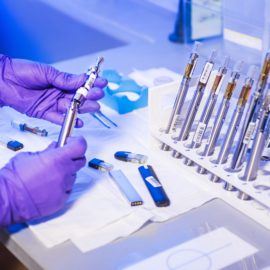

This article is an excerpt from the Shortform book guide to "I'm Glad My Mom Died" by Jennette McCurdy. Shortform has the world's best summaries and analyses of books you should be reading.
Like this article? Sign up for a free trial here.
What does a toxic mother-daughter relationship look like? What kind of boundaries did Debra McCurdy cross with her daughter Jennette?
Jennette McCurdy’s memoir I’m Glad My Mom Died describes the tumultuous relationship between her and her abusive mother, Debra. Jennette goes into detail about the types of abuse she experienced from her mother, which mainly stemmed from a lack of boundaries between the two.
Keep reading to learn more about this toxic mother-daughter relationship.
The Lack of Emotional and Physical Boundaries Between Debra and McCurdy
McCurdy and her mom are so close that there are few emotional or physical boundaries between them. When teenaged McCurdy finally starts to assert some independence from her mom, Debra punishes her for it, showing the effects of this toxic mother-daughter relationship.
Debra doesn’t have many friends and, until McCurdy meets her co-star Miranda Cosgrove on iCarly, McCurdy doesn’t, either. When McCurdy is a young girl, Debra tells her repeatedly that she is her best friend and that she’d rather have McCurdy than any man. It makes McCurdy feel special to be so close to her mom.
Throughout McCurdy’s childhood—until she is 17—Debra showers with her. Sometimes Debra showers with both McCurdy and her brother Scottie, who is 16. This makes McCurdy and her brother extremely uncomfortable. Debra says she has to shower with her because she was trained as a hairstylist and only she knows how to properly shampoo and condition McCurdy’s hair.
(Shortform note: Although she doesn’t say in the book how old she was when Debra made her shower with Scottie, McCurdy has said in interviews that she was 11. While experts differ as to when parents should stop showering with their children, they agree that it’s no longer appropriate to do so if the children don’t want to, whether it’s because they feel uncomfortable or they simply want privacy. This often happens between the ages of three and eight years old.)
During the showers, Debra performs breast and vaginal “exams” on McCurdy. She says this is to check for cancer. McCurdy dissociates from her body when this is happening and thinks hard about Disneyland to remove herself mentally from her present reality. When the “exams” are over, McCurdy feels immense relief.
After Debra’s cancer comes back, she’s in a wheelchair and unable to drive McCurdy to the set of her show. McCurdy is 18 but Debra didn’t want her to learn to drive because she said her time would be better used doing other things, such as practicing lines. So she arranges for McCurdy to get her own apartment closer to the set. McCurdy is excited to finally be living on her own, but on her first night there, Debra invites herself over to spend the night—and never leaves. She sleeps in McCurdy’s bed with her; it’s hard for McCurdy to sleep because Debra clings to her all night.
One day, McCurdy lies to Debra that she’s having a sleepover with Miranda Cosgrove, whom she had grown close to, so she could spend the night with a man. Debra detects the lie and screams at McCurdy that she’s a dirty whore, throwing a remote control at her. McCurdy goes on to have a relationship with the man, but she keeps it secret from her mom.
When McCurdy and her boyfriend go on vacation to Hawaii together, McCurdy tells her mom that she’s with a gay friend (the only men Debra wants McCurdy to spend time with are Mormons and gay men). However, the paparazzi take photos of McCurdy and her boyfriend together. Upon seeing the shots in the news, Debra goes ballistic. She calls McCurdy about 100 times, leaving her voicemails, and sending her emails in which she tells McCurdy she’s a slut, evil, and a monster, and she also goes into detail about the sex she imagines McCurdy and her boyfriend are having. Debra goes so far as to post a note to McCurdy’s fan page about how awful she is. She accuses McCurdy of causing her cancer to come back and says that she and McCurdy’s brothers all disown McCurdy.
Emotional Abuse, Emotional Incest, and Sexual Abuse
As previously discussed, narcissistic and emotionally immature parents engage in emotional abuse of their children. This abuse can take many forms. In addition to manipulation, emotional outbursts, and shaming, emotional abuse can involve yelling and verbal aggression, constant criticism, isolation, passive aggression, excessive insults, and threats. Debra engages in many of these behaviors toward McCurdy.
One particularly insidious form of emotional abuse is emotional incest, sometimes also called emotional enmeshment or emotional parentification. Emotional incest occurs when a parent depends on a child to get their emotional needs met, treating the child like a surrogate spouse. The parent grooms the child to fulfill their needs and depends on the child for love and support, rather than the other way around. This creates a situation where there are very few boundaries between the parent and the child.
The relationship between Debra and McCurdy similarly lacks emotional—or physical—boundaries. Debra relies on McCurdy for her happiness and to fulfill her own dreams of becoming an actress. When McCurdy tries to assert her independence in any way (such as by living on her own, learning to drive, or dating someone), Debra thwarts or punishes her, sometimes violently. Debra physically imposes herself upon McCurdy and won’t allow her to perform even basic functions of living—showering and sleeping—without Debra right next to her, invading her privacy.
It’s unclear whether Debra’s behavior constitutes child sexual abuse, as this crime is generally defined as a form of child abuse in which a child is abused for the sexual gratification of the adult. However, McCurdy’s response to her mom’s invasive breast and vaginal exams—dissociating from her body and going somewhere else in her imagination—mirrors the response children (and adults) typically have to sexual abuse. Children experiencing sex abuse are essentially trapped, so their brains resort to dissociation as a survival mechanism to mentally “escape” the traumatic situation that would otherwise be unbearable. Regardless of the terminology used to describe Debra’s behavior, McCurdy describes its effects as highly traumatic.

———End of Preview———
Like what you just read? Read the rest of the world's best book summary and analysis of Jennette McCurdy's "I'm Glad My Mom Died" at Shortform.
Here's what you'll find in our full I'm Glad My Mom Died summary:
- Former child star Jennette McCurdy's autobiography
- McCurdy's difficult, often traumatic, relationship with her controlling mother
- What it's like to grow up as a child in the spotlight






